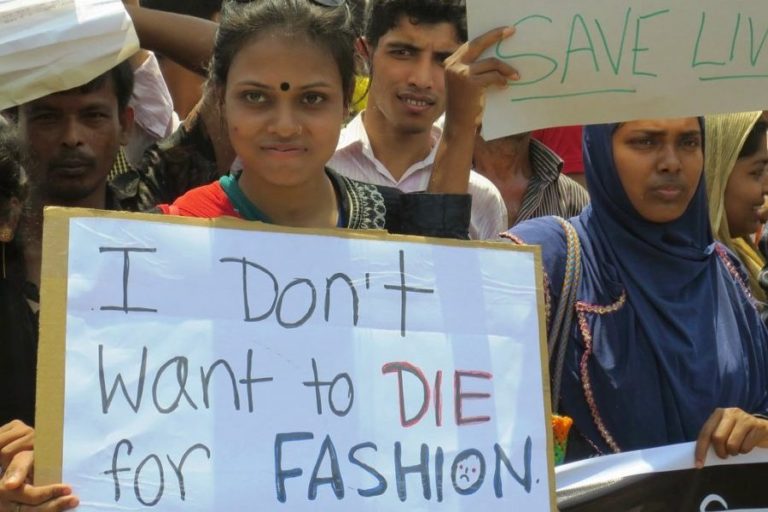Fast Fashion Is A Feminist Issue - Here’s Everything You Can Do To Help
Alice Hartwell
Social media is awash with ways we can be better feminists – so why are our fast fashion habits so often silent from the conversation? Make no mistake, cheap and easy fashion is one of intersectional feminism’s most pressing concerns in the modern world. This system relies on the exploitation of women and girls in developing countries working long hours for low pay, often left vulnerable to physical and sexual harassment.

Female exploitation for fast profit
An estimated 80% of fast fashion textile workers are women of colour, between the ages of 18-24 years old and earning less than £3 for 14 hours of gruelling work. These meagre wages are often earned in unsafe working conditions, not that this is of concern to big fast fashion labels, who enjoy the astronomical profits using this cheap and rapid production.
Alongside being unable to earn a living wage, many women face the threat of sexual violence and harassment. One study in Bangladesh found that 8 out of 10 female garment workers had either experienced or witnessed sexual harassment or violence at work.
Out of sight, out of mind
It can be very easy to fall under the spell of fast fashion, mainly because its humanitarian repercussions exist very far away. Rarely have we been taught to think about what goes into the clothes we buy, only that we always need more of them. It’s also ironic that many of the fast fashion giants promote a stance of surface-level feminism, selling clothes, and sometimes even whole ranges washed with “female-positive” slogans – I’m not sure how empowered the women who spend 14 hours a day making them feel.

1. Find out who’s making your clothes
Do you really know where the clothes from your favourite brands come from? Look into business supply chains, and if there’s no information available – hold brands accountable. Reach out and enquire, if they can’t be pinned down or it smells like greenwashing, you’re better off supporting businesses that willingly share a transparent, ethical supply chain. With all that being said, if you’re buying a top that costs less than £5, someone was exploited to make it. No detective work necessary here.
2. Switch up your shopping habits
Switching to ethical, slow fashion is the most effective way of ensuring feminist shopping habits. Sustainability is hitting the mainstream in a big way, ushering a wave of large and small brands working within a fair trade system. This ensures their garment workers are paid fair wages, and have access to safe working conditions. Not sure where to start? A quick browse through our article archive will introduce you to a diverse range of ethical brands doing good.
3.Educate yourself (and those around you)
We can’t demonise people for shopping fast fashion, we’ve all done it, simply because it’s the culture we’ve grown up in. Most people don’t even realise the extent of exploration female workers go through in developing areas of the world. It’s also important to note that, for many, the prices of fast fashion are the only accessible option. What we can all do, however, is educate ourselves – read a book, listen to a podcast, even watch a few TikToks, and share what you’ve learned to help us all shop smarter and support women who need it most.
Share This Story
Related Posts

Did ChatGPT Play a Role in Fueling California’s Wildfires?
Did ChatGPT Play a Role in Fuelling California’s Wildfires? Alice Hartwell Credit: Unsplash Early 2025 headlines were dominated by the devastating wildfires that swept through

Is Outlet Shopping Actually Sustainable? Let’s Discuss
Is Outlet Shopping Actually Sustainable? Bianca Foley Outlet shopping and discount designer stores have long been the ultimate fashion treasure hunt—scoring past-season gems at a

Sustainable Bakeries to Visit in the UK
(Image credit: Mix Interiors) Sustainable Bakeries to Visit in the UK There’s nothing more comforting than indulging in freshly baked goods. But what if you

What’s Good in December: Fun, Ethical Things To Do In London
What’s Good In December: Fun, Ethical Events In London In Partnership with In Good Company December brings a magical mix of festive cheer and meaningful
